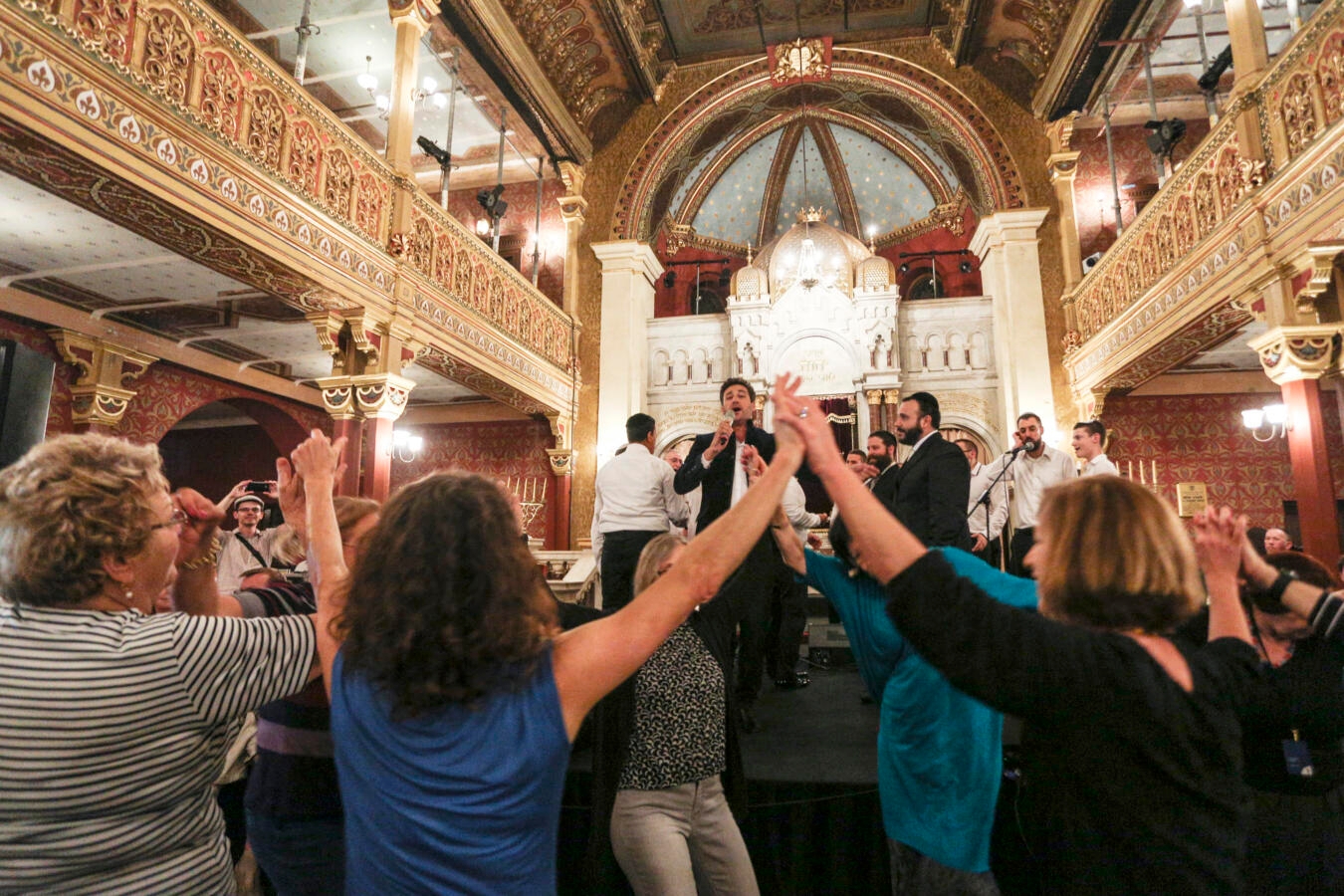No matter what the Jewish holiday is, you can depend upon the worship service lasting longer than its weekday counterpart! This is because each and every holiday in the Jewish calendar comes with its own unique set of insertions into the prayers intended to celebrate the special character of that festival. The same is true of the Shabbat services, which have special insertions turning every Saturday into a holiday as well. There is a predictable and regular structure of the holiday and Shabbat prayers.
First and foremost, the middle portion of every Amidah–or “standing” prayer, the central prayer of Jewish services–is different depending upon the day. In each Shabbat Amidah, we recite biblical verses or poetry about Shabbat, thanking God for the gift of a day of rest. On Passover, we thank God for the holiday of “our redemption” from Egypt; on Shavuot for the “giving of our Torah” at Mt. Sinai; and on Sukkot for the “season of our joy.” The central blessing of each festival Amidah thanks God for the gift of the season and for sanctifying the people of Israel with these holidays.
Rosh Hashanah and Yom Kippur, although somewhat more somber festivals, also include additions thanking God for these holidays. Only Hanukkah and Purim lack these inclusions. Instead, they have special additions in the regular Amidah thanking God for the miracles and redemptive acts that God wrought for the Jewish people in ancient times.
The three pilgrimage festivals, Shemini Atzeret, Hanukkah, and Rosh Chodesh are also characterized by the joyous singing and recitation of a group of Psalms called Hallel, meaning “praise.” Beginning with Psalm 113 and concluding with Psalm 118, the theme of Hallel is gratitude to God. Some Jews have added Hallel to their celebration of Yom Ha-Atzma’ut (Israel Independence Day). An abbreviated version of Hallel is recited on Rosh Chodesh and the last six days of Passover.
With your help, My Jewish Learning can provide endless opportunities for learning, connection and discovery.
Some holidays are also characterized by the chanting of one of the five megillot, or biblical scrolls, which further emphasize the character of the festival. Song of Songs, which is a celebration of young love, is chanted on Passover in the spring; Ruth, a story about a convert’s accepting the Torah, is chanted on Shavuot, which celebrates the assumption of the Torah on behalf of the whole people of Israel; and Ecclesiastes (Kohelet), which deals with the cyclical nature of all life, is chanted on Sukkot in the autumn. Purim, of course, is celebrated by the raucous chanting of the scroll of Esther (Megillat Esther).
Every Shabbat, a portion of the Torah is read in seven parts (aliyot), as well as a corresponding Haftarah (prophetic) reading. Each holiday has special Torah and Haftarah readings, and the three pilgrimage festivals and Yom Kippur add a special addition to the service called Yizkor. Yizkor is a semi-regular opportunity for congregants to recall their departed loved ones.
As on Shabbat, nearly all of the festivals include a special Musaf, or additional service, which also reiterates the spiritual theme of the day. For the three pilgrimage festivals, many congregations include the chanting of special religious poems, which further emphasize the agricultural or historical motif of the day.
And finally, every Shabbat and holiday (apart from Hanukkah and Purim) has its own special Kiddush, or blessing of sanctification over wine, and special additions to the Birkat Hamazon (grace after meals) to conclude festive meals.
Despite the seemingly chaotic nature of these additions and conclusions, there actually is a fairly predictable structure of prayers that serves to emphasize the festive nature of Shabbat and the Jewish holidays.
Birkat Hamazon
Pronounced: beer-KAHT hah-mah-ZONE, Origin: Hebrew, Grace After Meals, the blessing thanking God for the food.
Haftarah
Pronounced: hahf-TOErah or hahf-TOE-ruh, Origin: Hebrew, a selection from one of the biblical books of the Prophets that is read in synagogue immediately following the Torah reading.
Hanukkah
Pronounced: KHAH-nuh-kah, also ha-new-KAH, an eight-day festival commemorating the Maccabees' victory over the Greeks and subsequent rededication of the temple. Falls in the Hebrew month of Kislev, which usually corresponds with December.
Purim
Pronounced: PUR-im, the Feast of Lots, Origin: Hebrew, a joyous holiday that recounts the saving of the Jews from a threatened massacre during the Persian period.
Shabbat
Pronounced: shuh-BAHT or shah-BAHT, Origin: Hebrew, the Sabbath, from sundown Friday to sundown Saturday.
Shavuot
Pronounced: shah-voo-OTE (oo as in boot), also shah-VOO-us, Origin: Hebrew, the holiday celebrating the giving of the Torah at Mount Sinai, falls in the Hebrew month Sivan, which usually coincides with May or June.
Sukkot
Pronounced: sue-KOTE, or SOOH-kuss (oo as in book), Origin: Hebrew, a harvest festival in which Jews eat inside temporary huts, falls in the Jewish month of Tishrei, which usually coincides with September or October.
Torah
Pronunced: TORE-uh, Origin: Hebrew, the Five Books of Moses.
Yizkor
Pronounced: YIZZ-kur, Origin: Hebrew, literally “May God remember,” Yizkor is a prayer service in memory of the dead, which is held on Yom Kippur and on the last day of each of the three festivals, Passover, Shavuot and Shemini Atzeret.
Yom Kippur
Pronounced: yohm KIPP-er, also yohm kee-PORE, Origin: Hebrew, The Day of Atonement, the holiest day on the Jewish calendar and, with Rosh Hashanah, one of the High Holidays.



